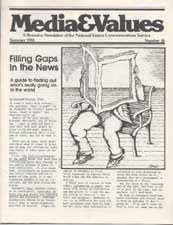Filling Gaps in the News
|
This article originally appeared in Issue# 16
|
A guide to finding out what's really going on in the world
In today's media-rich culture, the question, "what is news?" is as enigmatic as Pilate's query to Jesus, "what is truth?" two thousand years ago.
Events of the past decade --Vietnam, Watergate, now El Salvador -- make us more and more aware that what many people believe to be the news, meaning factual information about a person or event, may not be that at all
There are at least three problem areas when it comes to coverage of news and information today, especially in other parts of the world.
First, the limitation/demands of the media means that much good information never gets through to the public because of space or time Constraints It also means that, particularly on television, the news selected and the a-mount of time given to it may depend on whether it can be visualized, and the more action the better.
Secondly, bias, whether cultural or ideological, inevitably affects the way events are reported, edited and presented. Although journalists strive to be "objective," that is never completely possible in reality. Tragic examples of attempts by First World reporters to explain Third World views are too numerous to mention.
A third area of concern is that today, information is power, and those with access to information can manipulate it -- and the media trying to cover it -- for their own purposes. Needless to say, it is difficult for even the most assiduous news team to find out the facts when information is Concealed or even distorted by those who have access to it, whether that be a government, a corporation or a Church.
But for those on the receiving end of the news, and that is all of us most of the time, such an analysis isn't much help.
We look to newspaper headlines, radio bulletins and network shows to keep us informed of what's going on. If we can't count on them to tell us, what can we do?
To answer this question, Media&Values spoke to several U.S. religious leaders to find out where they get the information they need to make judgments about world situations.
All pointed out that in the U.S. we have access to a wide diversity of media. The important thing is to be aware of the limitations of different media and the perspective each presents.
It is also important, they believe, to distinguish between the many uses we may have for information. If we want an update on the Pope's health following his recent attack, then the networks or news services could provide it adequately enough. If, on the other hand, we're looking for information about a complex issue, like U.S. investments in South Africa or the political situation in El Salvador, then we will need other sources.
What sources?
Sr. Carol Coston, OP, says that at NETWORK, they try to stay in touch "with groups that have personal contacts and therefore first-hand information." For international issues this means groups like Maryknoll (their magazine is excellent, she says) and the Washington Offices on Latin Mierica and Africa.
David Brinkley
Even for U.S. legislative issues they give more weight to what they learn by personally attending hearings than by what they receive from the public media. She pointed out, though, that she would listen to National Public Radio's daily evening news show, All Things Considered, "every day if I could."
Coston also had praise for The MacNeil/Lehrer Report and periodic documentaries offered on PBS.
As for staying current on international news NETWORK subscribes to at least one substantive publication for every continent, for example, Africa News. For good coverage on a broad range of issues, she recommends In These Times, The Progressive, and Mother Jones.
When we asked Jason Petosa, publisher of the National Catholic Reporter, what sources he counted on, he promptly replied, "Besides NCR?!" Ue is proud of the Reporter's coverage of Latin American issues and counts on writers like Penny Lernoux for on-the-spot analysis of situations there.
Because "we are in the information business," Petosa reads widely. 'We take almost everything," he laughed, "New Republic, The Nation, Christianity & Crisis, Catholic Worker, The Other Side, America, Christian Century, Sojourners."
He also reads business publications like Forbes and Fortune which 'cold-bloodedly assess and evaluate world events according to the profit perspective...I don't share their values but I can learn from their analysis."
Another regular reader of business publications is Rabbi Marc Tannenbaum of the American Jewish Committee. He reads The Wall Street Journal daily because "if you discount the business bias, their lead stories do some of the most comprehensive reporting on social issues -- e.g. black poverty in America or economic development in the Third World."
He also studies religious publications, including Catholic diocesan newspapers, because most of them "use sources that really know what's going on."
"The best way to get the truth," says sociologist and author Marie Augusta Neale, SND, is "from the people who are involved."
She points out that for every social issue that emerges, organizations allied to those oppressed, will spring up. Often they are related to the established churches and they usually establish a newsletter. "You have to find those little newsletters,'' she says, "to know what's really happening."
Mary Clare Yates, RSM
Groups like the Committee in Solidarity with the People of El Salvador or church funded Washington Offices on Latin America and Africa provide excellent analysis based on information from people who are there, she said.
In trying to determine whether you can trust a source or not she gives one rule of thumb: "listen to the groups that take the side of the poor, not in words but in actions."



